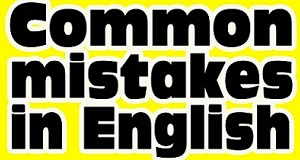When you are getting familiar with a new language, confusion often occurs as a result of a written or spoken error. But there is no need to worry as people make mistakes all the time when learning new things. Even native speakers can be often observed making mistakes. The thing that we should remember is that we must learn from these mistakes for betterment. Some students who major in English become frustrated when they unknowingly make mistakes while speaking or writing and then spend a lot of time correcting those mistakes. Moments like these are unavoidable but they create an opportunity to learn.
Some of the common mistakes that could be avoided are stated below.
- Its or it’s
Not correct: Lion hunts it’s prey furiously.
Correct: Lion hunts its prey furiously.
“Its” represents ownership of a noun, whereas “it is” and “it has” are the compressed versions of “it’s”. The validity of “It’s” in a statement can be known by expanding and applying it in the statement. - Is or are for a subject
Not correct: The list of vegetables are on the table.
Correct: The list of vegetables is on the table.
Sometimes an English sentence has a singular subject which consists of multiple elements. In the above sentence, the subject “list” is singular but “vegetables” is plural. Always use “is” or “are” according to the main subject of the sentence. - Went or Gone
Not correct: He had already went to the market by the time we reached.
Correct: He had already gone to the market by the time we reached.
If there is a confusion in using “went” or “gone”, remember that gone always follows an auxiliary verb such as had, has, have, are, was, is, am, be and were. Whereas “went” does not have any auxiliary verb before it. - See, Look, Watch
Not correct: Stop watching my personal files. I look at the falling water. I look at them playing basketball every day.
Correct: Stop looking at my personal files. I watch the falling water. I see them playing basketball every day.
Look means to look at something directly. Watch means to look at something carefully, usually something moving. See means to look at something that comes into our sight, that we were not looking for. - Figuratively or Literally
Not correct: I am literally freezing because of the cold weather. Figuratively, the temperature is -15 degrees out here.
Correct: Figuratively speaking, I am freezing because of the cold weather. It is literally -15 degrees out here.
“Figuratively” is used to exaggerate a statement. “Literally” means actually or really. - Run-on Sentences
Not correct: I am a man and I am a good father and I am an office worker.
Correct: I am a man. I am a good father and an office worker.
If it can’t be said in one breath, it shouldn’t be written like that either. A sentence in which two or more independent statements are joined without proper punctuation is a run-on sentence. The above example is missing a period after “man,” and the example should contain two different sentences. - Apostrophes
Not correct: A man’s hat was left on the table. / Two cats use the dish. It is the cat’s dish.
Correct: A man‘s hat was left on the table. / Two cats use the dish. It is the cat’s’ dish.
Apostrophes indicate that something is owned by the noun. Even though we are talking about the hat which is owned by the man, apostrophes are not in the first sentence. In the second sentence, there is more than one cat, but the apostrophe is used incorrectly. An apostrophe is added after the “s” in plural nouns that end with “s”. - Punctuation
Not correct: Dear Mrs. Stones: I am interested in the job and want to thank you for the interview! I hope I will be considered for the programs, A, B, and C.
Correct: Dear Mrs. Stones, I am interested in the job, and I wanted to thank you for the interview. I hope I will be considered for the programs: A, B, and C.
Be sure to understand the purpose of your punctuation. In the example above, when addressing Mrs. Stones, only a comma should be included. Colons are used when you want to make a list, and usually not when you want to address someone. The exclamation point may be viewed as an unprofessional mark. They’re used to illustrate strong emotion.
Pronunciation
Other than these mistakes, mispronunciation is also common usually among non-native speakers. Every non-native English speaker has a mother tongue which helps him to differentiate between various sounds. While learning a foreign language the speaker must know that a different language uses a unique set of sounds and orthographic rules. Following are some common pronunciation mistakes people make:
Word Actual Pronunciation Mispronounced as =================================================== WOMEN wi-min wo-men PIZZA peet-zaa pee-zaa IRON ai-yun aai-run DATA day-taa daa-taa WEDNESDAY wenz-day wed-nes-day




